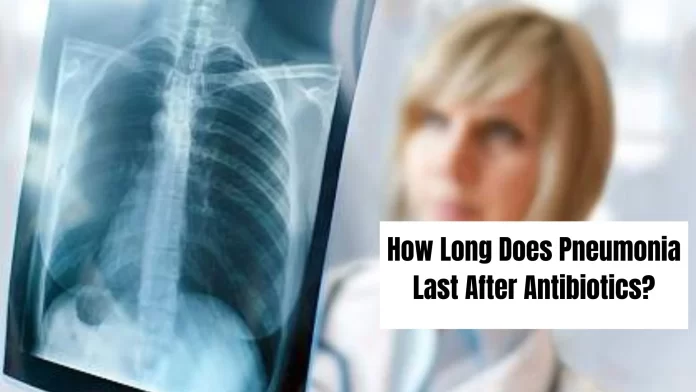Want to know how long does pneumonia last? Well, you have landed on the right article.
Pneumonia, an inflammation of the lungs caused by pathogens, can last from a few days to a few weeks. The duration varies based on factors such as overall health, the specific pathogen, and medical intervention. Seeking proper medical care is essential for a timely and complete recovery.
In this article, we will explore the typical duration of pneumonia, the factors that influence its length, and the importance of seeking appropriate medical care for a swift and complete recovery.
What Is Pneumonia?
Pneumonia is a lung infection that can impact either one or both lungs. It results in the accumulation of fluid or pus in the air sacs, known as alveoli.
Types of Pneumonia
There are several types of pneumonia, each caused by different pathogens or acquired in different ways. Some common types of pneumonia include:
Bacterial Pneumonia
This type of pneumonia is caused by bacteria, with Streptococcus pneumoniae being the most common bacterial pathogen. Other bacteria, such as Haemophilus influenzae and Legionella pneumophila, can also cause bacterial pneumonia.
Viral Pneumonia
Viral infections, particularly from respiratory viruses such as influenza (flu) viruses, respiratory syncytial virus (RSV), and the SARS-CoV-2 virus (which causes COVID-19), can lead to viral pneumonia. Viral pneumonia is usually milder than bacterial pneumonia.
Fungal Pneumonia
Fungal pneumonia is less common and typically affects individuals with weakened immune systems or those exposed to specific environmental sources. Fungi like Pneumocystis jirovecii (associated with HIV/AIDS) and Aspergillus species can cause fungal pneumonia.
Aspiration Pneumonia
This type of pneumonia occurs when foreign substances, such as food, liquids, or vomit, are inhaled into the lungs, leading to infection and inflammation.
Hospital-Acquired (Nosocomial) Pneumonia
This type of pneumonia is acquired during a hospital stay, usually more than 48 hours after admission. It is often caused by drug-resistant bacteria, such as methicillin-resistant Staphylococcus aureus (MRSA) or Pseudomonas aeruginosa.
Community-Acquired Pneumonia (CAP)
CAP refers to pneumonia acquired outside of healthcare settings. It can be caused by various pathogens, including bacteria, viruses, or fungi, and is typically milder than hospital-acquired pneumonia.
Causes pneumonia
Pneumonia can occur when your immune system responds to an infection in the small air sacs of the lungs, causing inflammation and fluid leakage.
Various bacteria, viruses, and fungi can cause the infections that lead to pneumonia. In adults, bacteria are the most common culprits, while viruses are the primary cause among school-aged children. Common illnesses that can result in pneumonia include:
- Rhinovirus (common cold)
- SARS-CoV-2 (COVID-19)
- Influenza virus (the flu)
- Human metapneumovirus (HMPV)
- Human parainfluenza virus (HPIV)
- Legionnaires’ disease
- Mycoplasma pneumoniae bacteria
- Pneumococcal disease
- Pneumocystis pneumonia
- Respiratory syncytial virus (RSV)
Symptom
The symptoms of pneumonia can vary depending on the severity of the infection and the individual’s overall health. Common symptoms include:
Cough: Pneumonia often presents with a persistent cough, which may produce mucus (phlegm). The cough can be dry or accompanied by green, yellow, or bloody sputum.
Fever: A high fever, usually above 100.4°F (38°C), is a typical symptom of pneumonia. The fever may be accompanied by sweating and chills.
Shortness of breath: Pneumonia can make it difficult to breathe, leading to shortness of breath or rapid, shallow breathing. This symptom is particularly noticeable during physical exertion or while lying down.
Chest pain: Some individuals may experience chest pain or discomfort, which can be sharp or a dull ache. The pain may worsen during coughing or deep breathing.
Fatigue: Pneumonia can cause extreme fatigue and weakness, leading to a lack of energy and decreased ability to perform daily activities.
Sore throat: In some cases, individuals with pneumonia may experience a sore throat or hoarseness due to inflammation in the respiratory tract.
Headache and body aches: Pneumonia may cause headaches and general body aches, similar to those experienced during a cold or flu.
Confusion (in older adults): Older adults or individuals with weakened immune systems may experience confusion or changes in mental awareness as a symptom of pneumonia.
How long does pneumonia last?
Recovery from pneumonia can vary in duration. While some individuals may start feeling better and resume their regular activities within 1 to 2 weeks, it is important to note that the recovery period can take longer for others.
Pneumonia Treated
Here are some common treatment methods for pneumonia:
Antibiotics: If the pneumonia is caused by bacteria, antibiotics are prescribed to target and eliminate the bacterial infection. The choice of antibiotics depends on the suspected or identified bacteria and their sensitivity to specific medications.
Antiviral medications: In cases where viral pneumonia is diagnosed, antiviral medications may be used to help combat the viral infection. However, antiviral drugs are only effective against specific viral strains.
Antifungal medications: For fungal pneumonia, antifungal medications are used to treat the underlying fungal infection.
Fever and pain relievers: Over-the-counter medications such as acetaminophen or nonsteroidal anti-inflammatory drugs (NSAIDs) may be recommended to reduce fever, relieve pain, and alleviate discomfort associated with pneumonia.
Cough medicine: Cough suppressants or expectorants may be prescribed to help manage cough symptoms. However, it is important to consult a healthcare professional before using any cough medicines, as they may not always be suitable or necessary.
Oxygen therapy: In severe cases of pneumonia where oxygen levels are low, supplemental oxygen may be administered through a mask or nasal tubes to ensure adequate oxygen supply to the body.
Fluids and rest: It is crucial to stay well-hydrated by drinking plenty of fluids and getting ample rest to aid the body’s healing process and support the immune system.
Conclusion
In conclusion, pneumonia is a respiratory infection that can be caused by various pathogens. Prompt medical treatment and supportive care are essential for recovery. While some individuals may feel better within 1 to 2 weeks, recovery times can vary. Following healthcare advice and practicing good respiratory hygiene are crucial for managing pneumonia effectively.
I hope you liked our article on how long does pneumonia last, if you have any comments or suggestions do share them in the comments below.
FAQ
Q1: Can pneumonia be treated at home?
Ans: Mild cases of pneumonia can be treated at home with rest, fluids, and prescribed medications. However, severe cases may require hospitalisation.
Q2: Are antibiotics always necessary for treating pneumonia?
Ans: Antibiotics are used to treat bacterial pneumonia, but viral pneumonia does not respond to antibiotics. Antiviral medications may be prescribed for viral pneumonia.
Q3: How long does it take to recover from pneumonia?
Ans: Recovery time varies, but it can take anywhere from a few days to several weeks. Individual factors and the severity of the infection can influence the recovery period.
Q4: Does getting vaccinated protect against pneumonia?
Ans: Vaccinations, such as the pneumococcal and influenza vaccines, can help prevent certain types of pneumonia and reduce its severity if contracted.







